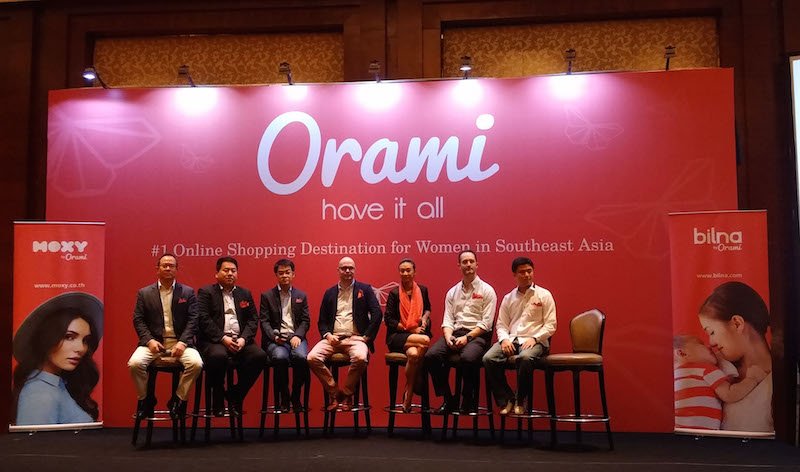
Shannon Kalayanamitr is the co-founder of Moxy and served as Orami Group’s CMO after its merger with Bilna. Photo credit: Shannon Kalayanamitr.
Shannon Kalayanamitr, chief marketing officer and co-founder of women-themed ecommerce site Orami, has left the company.
“Today marks the end of my journey with Moxy/Orami,” she wrote in a Facebook post yesterday. “This journey has been irreplaceable … and I will most definitely do it all over again in a heartbeat.”
She leaves Orami on good terms, Kalayanamitr told Tech in Asia. Her plan is to pursue new challenges in working with women and minority groups in Southeast Asia.
We acquired Moxy because of its women DNA.
It’s not uncommon for startup founders to move on from their companies after some years, especially once it’s been acquired by another entity.
Yet Kalayanamitr’s departure from the company is worth noting.
Orami is an ecommerce site specifically addressing Southeast Asian women, and she was the sole female co-founder. It draws attention to the still gaping gender imbalance in the tech industry.
Female DNA
Orami is the result of a rapid sequence of startup acquisitions and mergers.
It all began with Moxy, the company Kalayanamitr co-founded with two male partners in Thailand in 2013. Prior to that, Kalayanamitr worked at global consulting firm PwC, Lehman Brothers, and Lazada.
When Moxy was acquired by another Thai startup, WhatsNew, it took on Moxy’s brand.
“Female content, community, and commerce is the future,” WhatsNew CEO Bounthay Khammanyvong told Tech in Asia at that time. “With the Moxy acquisition, we are adding a strong woman leader with a female-centric brand … [we acquired it] because of its women DNA.”
Coincidentally, WhatsNew originally also had one female co-founder, Sarah Huang, but she departed the startup in 2014, with Khammanyvong taking over.
Moxy later merged with Bilna in Indonesia, relaunching as Orami.
Bilna – founded by two men – was an ecommerce store for mom and baby supplies, which complemented Moxy’s range of products in fashion, accessories, and lifestyle.
The companies were drawn together by the customers they addressed: Southeast Asian women. They represent a large market opportunity.
A study by the Economist Intelligence Unit in 2014 found that, across the region, women are driving the growth of online shopping. Women also often influence the purchasing decisions of household goods and shop for themselves as well as their family and friends.
No female board member

Moxy and Bilna rebrand as Orami after completing one of the biggest ecommerce mergers Southeast Asia has seen so far. Photo credit: Tech in Asia.
Despite growing out of “women DNA,” Orami’s top leadership is largely male.
Jeremy Fichet joined the company in 2015 as group CEO after Moxy’s merger with Bilna. Bilna co-founder Ferry Tenka took on the role as Orami Group’s executive chairman and also heads up the company’s Indonesia operations. Eka Himawan, the other Bilna co-founder, is executive vice chairman and group CFO. There’s no female board member.
The gender gap exists on all sides of the table in the tech industry. What’s causing it is a frequently discussed and researched topic.
“Is it because entrepreneurship is not encouraged among women? Is it because there are not enough women engineers? Is it because VCs are predominantly male? Is it because VCs are biased?” asks Nikhil Kapur of venture capital firm Gree Ventures in a blogpost examining the lack of gender diversity in the startup ecosystem.
Sometimes, women drop out – like Orami’s case.
Fichet says his company has launched multiple initiatives inside the company and in partnership with women-focused organizations to promote women to top positions and support female employees.
He points out that Orami’s CEO in Thailand is a woman – she took over after Khammanyvong departed in 2016. 70 percent of the firm’s leadership positions are held by women – if the VP-level is included. Overall, 75 percent of Orami’s employees are female.
Fichet acknowledges the absence of women on the company’s board is an issue.
“The board is composed of investors and the VC industry is still overrepresented by men. This is not specific to Southeast Asia but a global issue. We are actually looking at bringing in female board members as this is definitely something we like to see evolving.”
All-male board rooms are common, agrees Kapur. “If there are only 5 to 10 percent female founders and even fewer female senior VCs, then it’s quite obvious that the boards will be predominantly male.”
Kapur says companies, especially those that are trying to target a female customer base, should work on improving their boards’ gender balance.
This post Sole female co-founder quits women-themed shopping site Orami appeared first on Tech in Asia.
from Tech in Asia https://www.techinasia.com/womenthemed-shopping-site-orami-lost-female-cofounder
via IFTTT
No comments:
Post a Comment